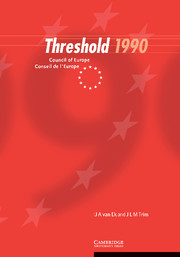Book contents
- Frontmatter
- Contents
- Preface
- Introduction
- 1 The objective: levels of specificity
- 2 The objective: general characterisation
- 3 The objective: extended characterisation
- 4 The objective: components of the specification
- 5 Language functions
- 6 General notions
- 7 Specific notions
- 8 Verbal exchange patterns
- 9 Dealing with texts: reading and listening
- 10 Writing
- 11 Sociocultural competence
- 12 Compensation strategies
- 13 Learning to learn
- 14 Degree of skill
- APPENDICES
10 - Writing
Published online by Cambridge University Press: 26 February 2010
- Frontmatter
- Contents
- Preface
- Introduction
- 1 The objective: levels of specificity
- 2 The objective: general characterisation
- 3 The objective: extended characterisation
- 4 The objective: components of the specification
- 5 Language functions
- 6 General notions
- 7 Specific notions
- 8 Verbal exchange patterns
- 9 Dealing with texts: reading and listening
- 10 Writing
- 11 Sociocultural competence
- 12 Compensation strategies
- 13 Learning to learn
- 14 Degree of skill
- APPENDICES
Summary
The objective for writing at Threshold Level is very limited. It is assumed that for this skill the actual needs of the majority of the members of the target group who are expected to be temporary visitors do not go beyond the ability to fill in certain forms, to write a few types of standard letter, and to write simple personal letters on subjects of common interest to themselves and friends or acquaintances. All this falls strictly within items 1 and 2 of the extended characterisation. It may be specified as follows:
The learners will be able to complete forms:
hotel registration forms
forms required when entering or leaving a foreign country
The learners will be able to write standard letters:
enquiring about price and conditions of accommodation
stating wishes as to size of rooms, arrangement (full board, etc.), amenities, view
enquiring about tourist attractions, sights, etc.
booking accommodation
The learners will be able to conduct personal correspondence:
simple messages such as greetings and congratulations
simple private letters concerning matters of common interest to themselves and friends or acquaintances.
The writing requirements of temporary residents, as set out in the extended characterisation, are of a somewhat different character. These learners will almost certainly be called upon to complete a wider range of official forms. They may need to write letters enquiring about accommodation to rent, and if need be, letters of complaint to landlords. They may send written invitations and write brief letters of thanks for hospitality received.
- Type
- Chapter
- Information
- Threshold 1990 , pp. 92 - 93Publisher: Cambridge University PressPrint publication year: 1998



